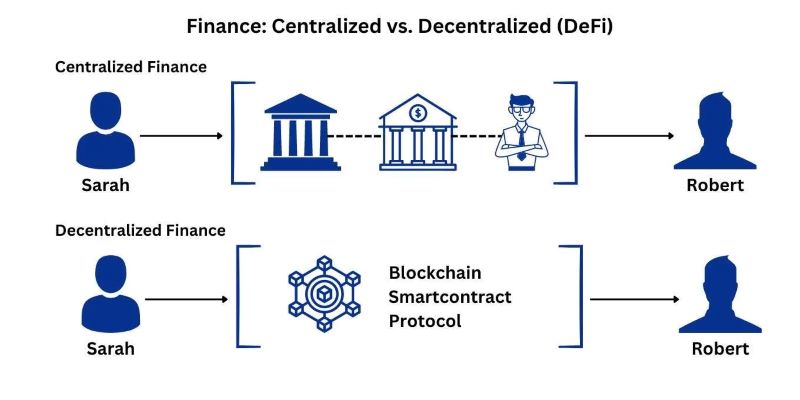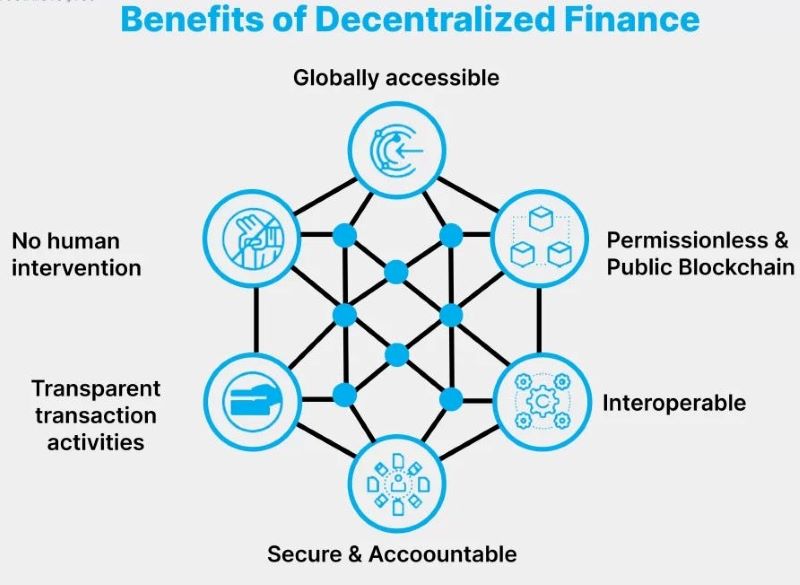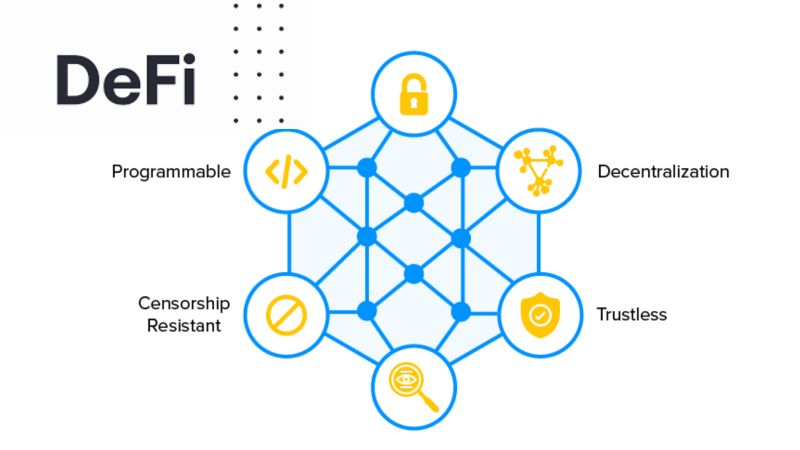Decentralized finance is disrupting the traditional financial landscape by leveraging blockchain technology to create a more accessible, transparent, and equitable financial ecosystem. Imagine a world where you can access financial services like lending, borrowing, and trading without the need for intermediaries like banks or brokers. That’s the power of DeFi, where smart contracts automate financial transactions and empower individuals with greater control over their assets.
What is DeFi ?
Decentralized Finance (DeFi) is an innovative financial system built on blockchain technology that aims to eliminate intermediaries and empower individuals with direct control over their financial assets. It utilizes smart contracts to automate financial transactions, making services like lending, borrowing, trading, and investment accessible to anyone with an internet connection. Unlike traditional finance, DeFi operates in a decentralized manner, removing the need for banks, brokers, or other centralized institutions, thereby increasing transparency, reducing costs, and promoting financial inclusion.
Centralized finance vs Decentralized Finance
Centralized finance
In the current centralized financial system, intermediaries such as banks, brokerages, and lenders control access to financial services and capital. Consumers often have to rely on these middlemen for various financial activities, from obtaining loans to trading securities. In the United States, regulatory bodies like the Federal Reserve and SEC oversee this centralized system, setting and amending rules over time. This structure limits consumer autonomy and creates a dependency on intermediaries who profit from every financial transaction.
Decentralized Finance
Decentralized finance (DeFi) disrupts the traditional model by removing intermediaries and empowering individuals through peer-to-peer exchanges. It enables everyday people to take control of financial activities like lending, borrowing, and trading, which were traditionally handled by banks, exchanges, and insurers.
For example, instead of earning a meager interest rate on savings held in a bank account, DeFi allows individuals to directly lend their money to others, earning the full interest without the bank taking a cut. This peer-to-peer lending model eliminates the need for intermediaries and their associated fees, resulting in higher returns for lenders and lower costs for borrowers.
While platforms like PayPal, Venmo, or Cash App may seem like peer-to-peer payment solutions, they still rely on traditional financial infrastructure like debit cards and bank accounts, making them ultimately dependent on centralized financial intermediaries. DeFi, on the other hand, operates independently of these traditional systems, offering a truly decentralized alternative.
DeFi runs on Blockchain
Blockchain and cryptocurrency form the bedrock of decentralized finance (DeFi), with blockchain serving as a decentralized, distributed public ledger recording all transactions in encrypted code. This distributed nature ensures every participant holds an identical copy, enhancing security and transparency while maintaining user anonymity.
Blockchain’s decentralized nature eliminates the need for intermediaries, as transactions are verified and recorded by participants through a complex mathematical process. This eliminates central control and fosters trust within the system.
Proponents argue that the decentralized nature of blockchain makes DeFi transactions inherently more secure and transparent than traditional, centralized financial systems, which are often viewed as opaque and less secure.
How DeFi is being used now
DeFi is currently being used to facilitate a wide range of financial transactions, from basic activities like payments and lending to more complex ones like yield farming and flash loans. Decentralized applications (dapps) and protocols, primarily built on the Ethereum blockchain, are the driving force behind this expanding ecosystem.
Some of the key areas where DeFi is being utilized include:
Traditional financial transactions: DeFi platforms enable activities like trading securities, insurance, lending, and borrowing, offering an alternative to traditional financial institutions.
Decentralized exchanges (DEXs): These peer-to-peer marketplaces allow users to trade cryptocurrencies directly, giving them more control over their assets.
E-wallets: DeFi developers are creating independent digital wallets that offer access to various cryptocurrencies and blockchain-based applications.
Stablecoins: These cryptocurrencies aim to maintain a stable value by pegging them to fiat currencies like the US dollar, providing stability for DeFi transactions.
Yield farming: This speculative activity involves lending crypto assets to earn rewards in the form of additional tokens or interest.
Non-fungible tokens (NFTs): These unique digital assets represent ownership of items like artwork or collectibles, creating new markets and opportunities.
Flash loans: These uncollateralized loans are executed and repaid within the same transaction, often used for arbitrage opportunities.
Risks and downsides of DeFi
Despite its innovative potential, decentralized finance (DeFi) carries significant risks due to its nascent nature and lack of regulatory oversight. The absence of consumer protections, akin to the FDIC insurance in traditional banking, leaves users vulnerable to potential losses. Additionally, the reliance on software systems makes DeFi platforms susceptible to hacking and exploitation, putting user funds at risk.
The collateralization requirements for DeFi loans, often exceeding 100% of the loan value, limit accessibility for many potential borrowers. Furthermore, the use of private keys for securing cryptocurrency wallets creates a risk of losing access to funds if these keys are lost or compromised. These factors underscore the importance of understanding and mitigating the risks associated with DeFi before participating in this evolving financial landscape.
How to get involved with DeFi
Get a Crypto Wallet
Rafael Cosman, CEO and co-founder of TrustToken, recommends setting up an Ethereum wallet like Metamask and funding it with Ethereum to get started in DeFi. However, he emphasizes the importance of securely storing the public and private keys associated with the wallet, as losing them could result in permanent loss of access to funds.
Trade Digital Assets
Doug Schwenk, chairman of Digital Asset Research, suggests starting with small trades on decentralized exchanges like Uniswap to gain firsthand experience in the DeFi landscape. However, he cautions newcomers to be prepared for potential losses as they learn to navigate this new terrain and understand the risks involved.
Look into Stablecoins
Stablecoins, a type of cryptocurrency pegged to stable assets like the US dollar, offer a less volatile entry point into the DeFi space, as illustrated by platforms like TrueFi. However, it’s crucial to remember that the digital asset market is fast-paced and carries significant risk. Starting slow, staying informed, and not overextending oneself are key to navigating this evolving financial landscape.
The future of decentralized finance
The future of decentralized finance (DeFi) holds immense promise, with the potential to revolutionize how we perceive and interact with financial services. As the technology matures, investors will gain more independence and flexibility in managing their assets, leading to innovative financial solutions that were previously unimaginable. DeFi also has far-reaching implications for the big data sector, opening up new avenues for monetizing and utilizing data in unprecedented ways.
However, despite its potential, widespread adoption of DeFi is still in its early stages. Education and awareness about the benefits and risks of DeFi are crucial to encourage greater participation from the general public. Furthermore, continued development of user-friendly tools and interfaces will be essential to bridge the gap between DeFi and mainstream adoption.
DeFi is more than just a buzzword; it’s a transformative movement that is reshaping the future of finance. While still in its early stages, DeFi’s potential to democratize access to financial services, reduce costs, and foster innovation is undeniable. As the technology matures and regulatory frameworks evolve, we can expect DeFi to play an increasingly prominent role in the global financial system.
Stay ahead of the curve and explore the latest developments in decentralized finance with Blockchain Bulletin Weekly, your trusted source for blockchain news and insights.


